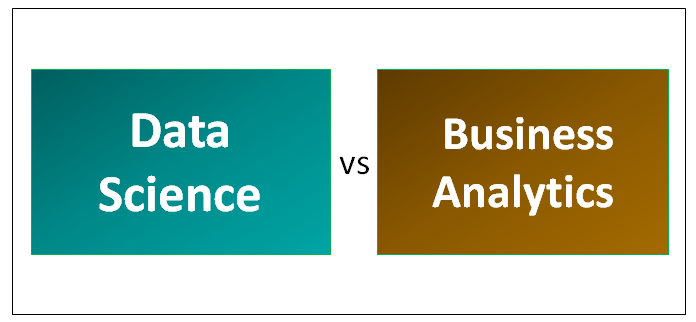
Difference Between Data Science vs Business Analytics
In the context of answering business problems, we discuss Data Science and Business Analytics. Both Data Science and Business Analytics involve data gathering, modeling, and insight gathering. The difference between the two is that Business Analytics is specific to business-related problems like cost, profit, etc. In contrast, Data Science answers questions like the influence of geography, seasonal factors, and customer preferences on the business. In short, Data Science is larger or superset of the two. Data Science combines data with algorithm building and technology to answer various questions. Recently Machine Learning and Artificial Intelligence have been doing their rounds and are set to take Data Science to the next level. Business Analytics, on the other hand, is the analysis of company data with statistical concepts to get solutions and insights.
Head to Head Comparison Between Data Science and Business Analytics ( Infographics)
Below are the Top 9 Comparisons Between Data Science and Business Analytics:
 Key Differences Between Data Science and Business Analytics
Key Differences Between Data Science and Business Analytics
Some key differences are explained below between Data Scientists and Business Analytics:
- Data Science is the science of data study using statistics, algorithms, and technology, whereas Business Analytics is the Statistical study of business data.
- Data Science is a relatively recent development in the field of analytics, whereas Business Analytics has been in place ever since the late 19th century.
- Data Science involves a lot of coding skills, whereas Business Analytics does not involve much coding.
- Data Science is a superset of Business Analytics. So, a person with Data Science skills can do Business Analytics but not vice versa.
- Data Science is a step ahead of Business Analytics, which is a luxury. However, Business Analytics is mandatory for a business to understand the working and gain insights.
- Data Science analysis results cannot be used in the day-to-day decision-making of the company, whereas Business Analytics is vital in management making key decisions.
- Data Science does not answer a clear-cut question. The questions are mostly general. Business Analytics, however, answers very specific business-related questions, mostly financial.
- Data Science can answer questions that Business Analytics can but not vice versa.
- Data Science uses both structured and unstructured data, whereas Business Analytics uses mostly structured data.
- Data Science has the potential to take leaps and bounds, especially with the coming up of Machine Learning and Artificial Intelligence, whereas Business Analytics is still taking slow steps.
- Data Scientists do not come across much dirty data, unlike Business Analysts.
- Data Science depends to a large extent on the availability of data, whereas Business Analytics is not.
- The cost of investing in Data Science is high, whereas that of Business Analytics is low.
- Data Science can keep pace with the Data of today. Data has grown and branched into a variety of data. Data Scientists are equipped with the right skills to deal with this. Business Analysts, however, do not possess this.
Data Science and Business Analytics Comparison Table
Below is the comparison table between Data Scientist and Business Analytics.
| Basis For Comparison | Data Science | Business Analytics |
| Coining of Term | DJ Patil and Jeff Hammerbacher, who were working on LinkedIn and Facebook, first coined the term Data Scientist in 2008. | Business Analytics has been used since the late 19th Century when it was put in place by Frederick Winslow Taylor. |
| Concept | The interdisciplinary field of data inference, algorithm building, and systems to gain insights from data. | Use of statistical concepts to extract insights from business data.
|
| Application-Top 5 Industries |
|
|
| Coding | Coding is used widely. The field is a combination of traditional analytics practices with sound knowledge of computer science. | Does not involve much coding. More statistics oriented. |
| Languages Recommendations | C/C++/C#, Haskell, Java, Julia, Matlab, Python, R, SAS, Scala, SQL, Stata | C/C++/C#, Java, Matlab, Python, R SAS, Scala, SQL |
| Statistics | Statistics is used at the end of the analysis following algorithm building and coding. | The whole analysis is based on statistical concepts. |
| Work Challenges |
|
|
| Data Needed | Both structured and unstructured data. | Predominantly structured data. |
| Future Trends | Machine Learning and Artificial Intelligence | Cognitive Analytics, Tax Analytics |
Conclusion
Given the recent developments, both can expect a major shift in data analysis. With the rapidly growing data or Big Data, businesses will have the opportunity to explore different varieties of data and help the management make key decisions. This is just not financial analysis but also the analysis of the role customer preferences, geography, etc., play in contributing to the growth of a company. Also, forecasting data seems to be the order of the day. The management wants to know where they will stand a couple of years in the future to make confident decisions.
In addition to the data and general trends, an important factor is skill learning. You can either learn from a Data Science course or a Business Analytics course. Both offer employees a lot of scope to learn and improve themselves. This learning is, in fact, a must to keep up with the recent developments. Gone are the days when analysis just involved statistics and survey data. Students and employees need to be versatile and constantly aim at learning new skills. With changing data and learning trends, Data Science and Business Analytics opportunities can be considered hot openings. The opportunities that lay ahead are plenty.
Recommended Articles
This has been a guide to Data Science vs Business Analytics. Here we have discussed Data Science vs Business Analytics head-to-head comparison, key differences, along with infographics and comparison tables. You may also look at the following articles to learn more –
 Key Differences Between Data Science and Business Analytics
Key Differences Between Data Science and Business Analytics